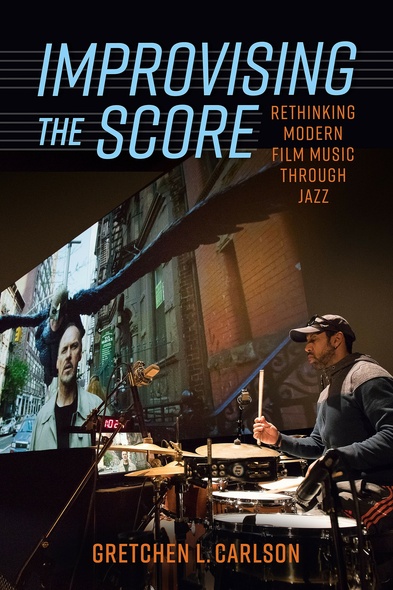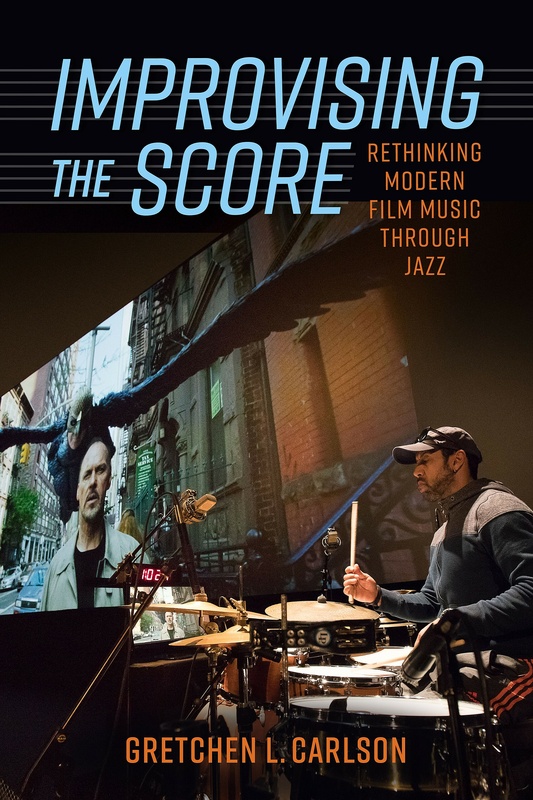
Improvising the Score
Rethinking Modern Film Music through Jazz
2023 Jazz Journalists Association (JJA) Jazz Awards for Books of the Year—Honorable Mention Recipient
On December 4, 1957, Miles Davis revolutionized film soundtrack production, improvising the score for Louis Malle’s Ascenseur pour l’échafaud. A cinematic harbinger of the French New Wave, Ascenseur challenged mainstream filmmaking conventions, emphasizing experimentation and creative collaboration. It was in this environment during the late 1950s to 1960s, a brief “golden age” for jazz in film, that many independent filmmakers valued improvisational techniques, featuring soundtracks from such seminal figures as John Lewis, Thelonious Monk, and Duke Ellington. But what of jazz in film today?
Improvising the Score: Rethinking Modern Film Music through Jazz provides an original, vivid investigation of innovative collaborations between renowned contemporary jazz artists and prominent independent filmmakers. The book explores how these integrative jazz-film productions challenge us to rethink the possibilities of cinematic music production. In-depth case studies include collaborations between Terence Blanchard and Spike Lee (Malcolm X, When the Levees Broke), Dick Hyman and Woody Allen (Hannah and Her Sisters), Antonio Sánchez and Alejandro González Iñárritu (Birdman), and Mark Isham and Alan Rudolph (Afterglow).
The first book of its kind, this study examines jazz artists’ work in film from a sociological perspective, offering rich, behind-the-scenes analyses of their unique collaborative relationships with filmmakers. It investigates how jazz artists negotiate their own “creative labor,” examining the tensions between improvisation and the conventionally highly regulated structures, hierarchies, and expectations of filmmaking. Grounded in personal interviews and detailed film production analysis, Improvising the Score illustrates the dynamic possibilities of integrative artistic collaborations between jazz, film, and other contemporary media, exemplifying its ripeness for shaping and invigorating twenty-first-century arts, media, and culture.
The issues it discusses are fascinating ones, and it’s a very worthwhile read.
Comprising case studies of four films—bookended by an introduction and a conclusion in which Carlson lays out her arguments and synthesizes her insights—this book upends the idea that scoring films is ancillary or secondary to filmmaking. . . . Carlston’s clear prose is very readable. Highly recommend.
[Improvising The Score is] a bold and challenging work, overall, which stimulates much thought.
The book is a valuable contribution to the literature on jazz in film and the working methods of auteur filmmakers as well as their intersections.
This book represents a substantial contribution to the growing discipline of film music studies, not to mention jazz studies. I have always been intrigued by films such as Birdman, Afterglow, and Mo’ Better Blues, but Carlson has found new ways to make them even more fascinating.
Carefully researched and engagingly written, Gretchen Carlson’s Improvising the Score is a most welcome addition to contemporary jazz studies. With a persistent focus on music practice, Carlson’s various case studies reveal important insights about jazz’s unique relationships to film and media. Interdisciplinary in the best sense of the word, Improvising the Score is sure to be a widely read and highly influential work of scholarship.
Carlson covers the topic from an enriching variety of perspectives (textual analysis, creative practices, industrial contexts). It’s refreshingly focused on contemporary films, and it’s concerned with jazz musicians as film composers—not with film composers utilizing jazz. A truly welcome addition to both film-music studies and jazz studies.
At long last, an account of the transformative entanglement between jazz and film. Carlson deftly weaves together sociological, ethnographic, legal, and technological understandings of creative labor—precisely reading texts, then widening out to broader issues in film and media. This is a book that busts open the canon and, in doing so, imagines a better future for jazz studies and music in film.
Gretchen L. Carlson is a musicologist and professor of music history and culture at Towson University. She has published articles on jazz and film in the Journal of the Society for American Music and Jazz and Culture.





